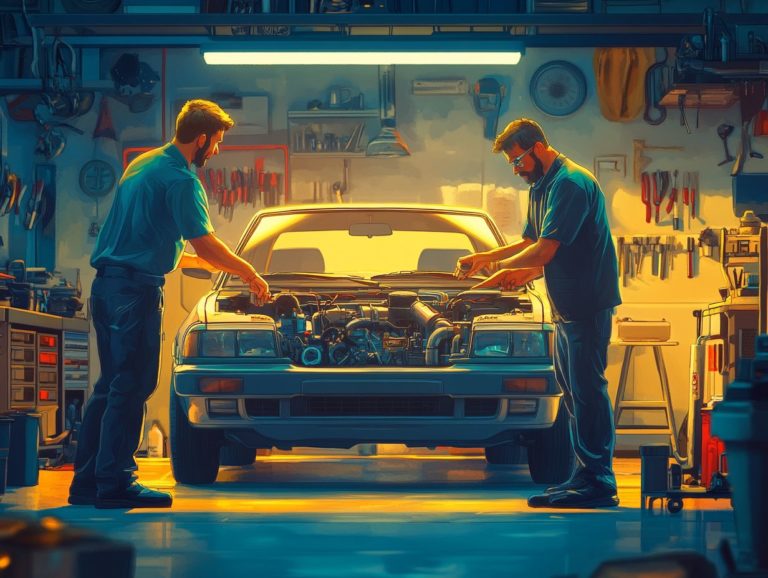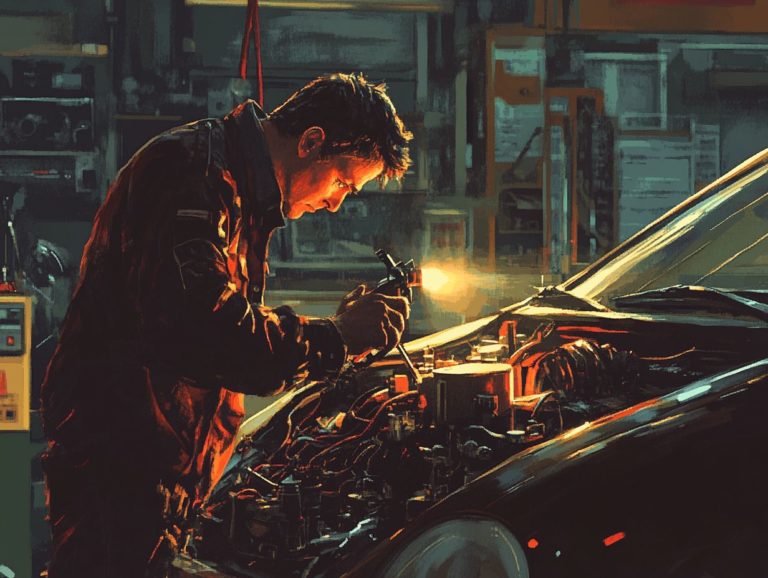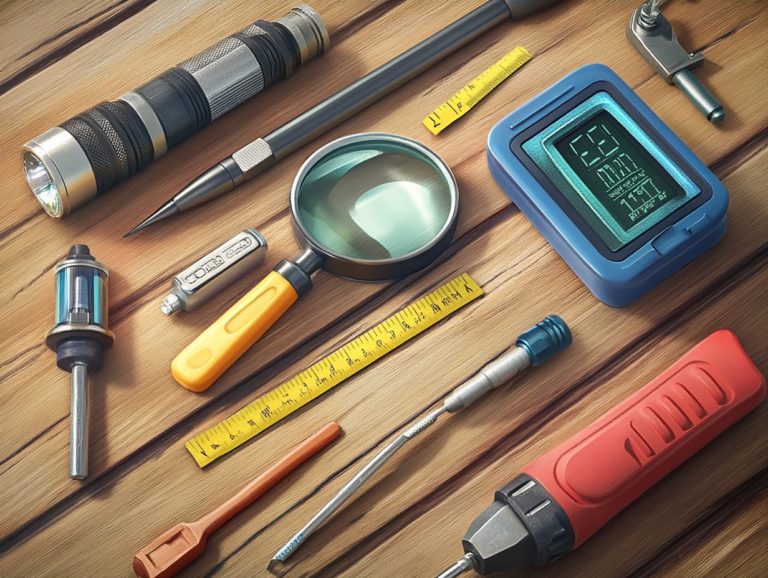What Car Buyers Need to Know About Inspections
If you’re thinking about buying a used car, understanding vehicle inspections is crucial! Grasping the significance of vehicle inspections can truly transform your buying experience. These evaluations ensure the car’s safety and reliability while shielding you from costly repairs later on.
From pre-purchase inspections to routine check-ups, having a keen understanding of what to look for and how to prepare equips you as a discerning buyer. This guide will delve into the various types of inspections, highlight critical issues to be aware of, and provide insights on how to interpret the results, enabling you to make well-informed decisions.
Contents
- Key Takeaways:
- Understanding Vehicle Inspections
- Types of Vehicle Inspections
- What to Look for During an Inspection
- How to Prepare for an Inspection
- Dealing with Inspection Results
- Frequently Asked Questions
- What is a vehicle inspection and why is it important for car buyers?
- Do all used cars require an inspection before purchase?
- Who should perform the vehicle inspection?
- What should be included in a vehicle inspection?
- How much does a vehicle inspection typically cost?
- Can a vehicle inspection be used for negotiating the price of a car?
Key Takeaways:
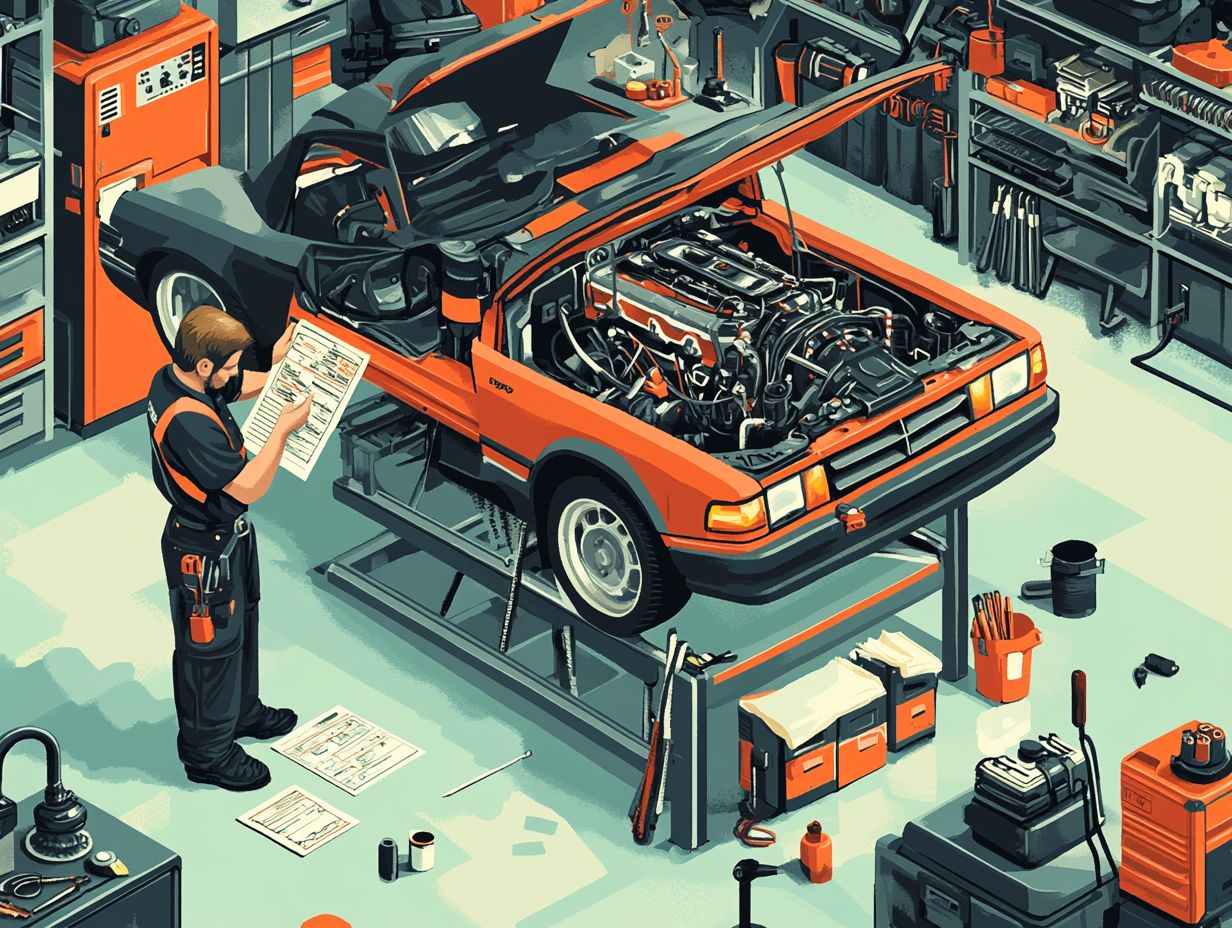
Don t skip that pre-purchase inspection! It could save you from unexpected repairs and expenses.
Be aware of common issues and red flags, including mechanical issues or hidden damage.
Have all necessary documents ready and ensure the vehicle is properly prepared for inspection to guarantee a smooth process and accurate results.
Understanding Vehicle Inspections
Understanding vehicle inspections is essential for anyone considering a used car purchase. A detailed check-up allows you to assess the car’s condition thoroughly, uncovering potential issues like accident damage, mechanical problems, or fluid leaks. Knowing what to look for in a car inspection can help you make an informed decision before you commit.
These inspections can range from a simple visual check to an in-depth evaluation by an independent mechanic. Both options can significantly influence your buying decision.
Getting a vehicle history report is also helpful. Reports from services like CarFax offer valuable insights into the car’s past incidents and maintenance records, ensuring you make an informed choice.
What are Vehicle Inspections?
Vehicle inspections are thorough assessments of your car’s condition. They can be conducted through methods ranging from a basic visual check to an in-depth examination by an independent mechanic.
These evaluations play a vital role in ensuring both safety and performance on the road. By scrutinizing critical components like brakes, tires, and the engine, mechanics can confirm that your vehicle is running smoothly and pinpoint any potential issues before they turn into costly repairs.
Vehicle inspections often involve gathering essential documentation, such as vehicle history reports, which shed light on any past accidents or repairs.
Understanding these assessments empowers you as a buyer or owner, enabling you to make informed decisions that enhance the longevity and reliability of your vehicle.
Why are They Important?
Vehicle inspections are important as they offer critical insights into the condition of a used car. They enable you to sidestep costly repairs that may arise from hidden issues like accident damage or fluid leaks.
When you invest in a pre-owned vehicle, the stakes are notably high. A thorough inspection acts as your safety net against potential pitfalls. Mechanics often uncover trouble codes error signals from your vehicle’s computer that indicate deeper engine issues or reveal evidence of prior collisions that the seller may not have disclosed.
Key aspects, such as brake functionality and tire wear, can be evaluated, helping you avert future safety hazards. By opting for vehicle inspections, you take a proactive step to ensure your investment is sound, ultimately shielding yourself from unexpected expenses down the road.
Types of Vehicle Inspections
Vehicle inspections are essential and can be divided into distinct categories: pre-purchase inspections and periodic inspections.
Each type serves a unique purpose in your car ownership journey, ensuring that you make informed decisions and maintain your vehicle’s optimal performance over time.
Pre-Purchase Inspections
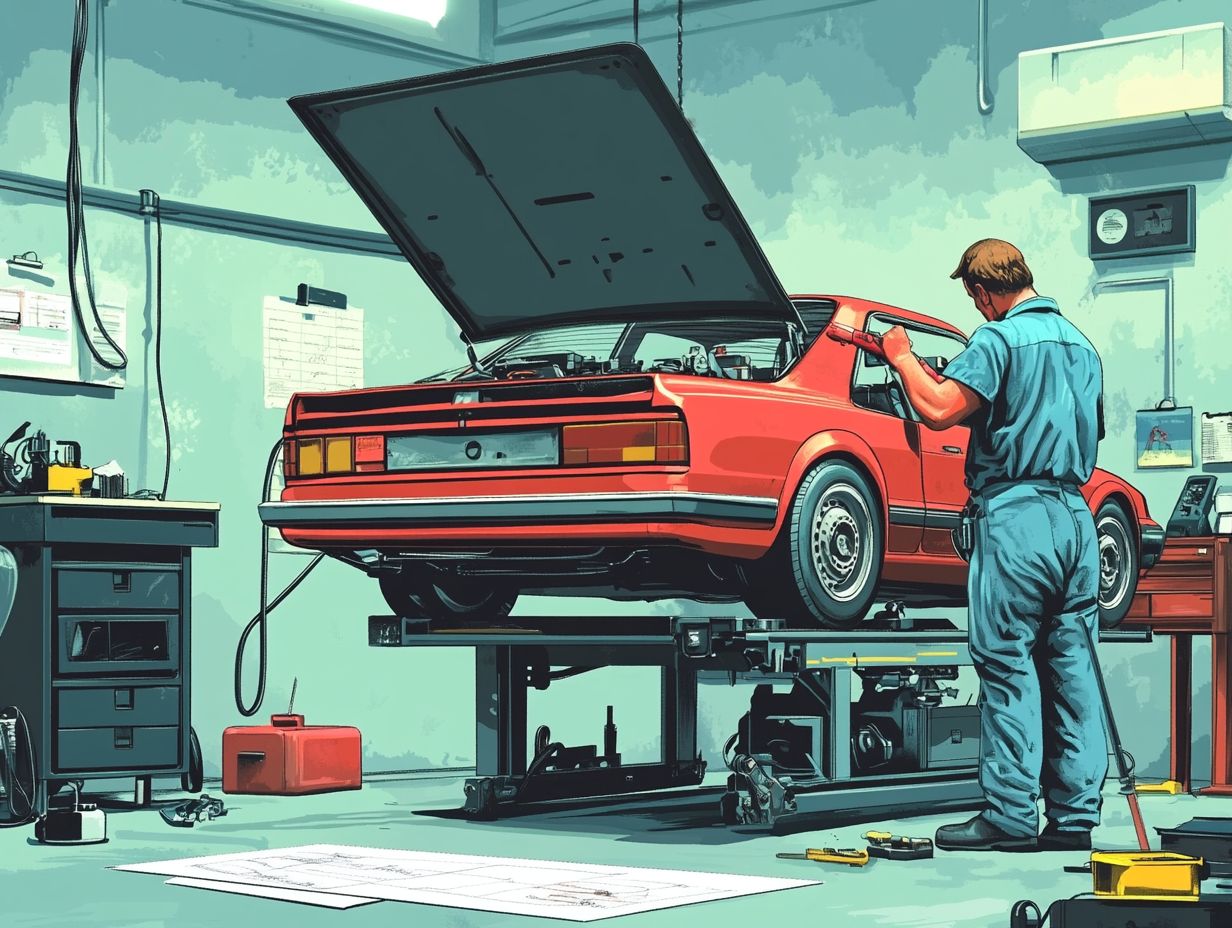
Pre-purchase inspections are thorough checks you should consider before buying a used car. An independent mechanic typically conducts these inspections to assess the vehicle’s condition and uncover hidden issues.
These checks include examining the car s parts, as well as reviewing both the exterior and interior features. They also involve looking into the vehicle’s maintenance history.
Understanding the true condition of the vehicle is essential for you as a buyer. It helps you avoid unexpected costs later. An independent mechanic offers an unbiased view, making sure you’re aware of visible and hidden problems.
Including a vehicle history report in your evaluation can enhance your understanding. It reveals vital details like past accidents, title issues, and service records. This information helps you make informed decisions about your potential purchase.
Periodic Inspections
Periodic inspections are your routine checks to keep your vehicle in optimal shape. They focus on critical aspects such as maintenance, safety recalls, and the overall condition of your car.
These inspections are vital for catching potential problems before they become serious issues. They cover essential components like brakes, tires, fluid levels, and exhaust systems.
Regular assessments not only extend your vehicle’s lifespan but also improve fuel efficiency and performance. By addressing any discrepancies found, you can save on costly repairs and enjoy a smoother driving experience.
Ultimately, these proactive steps are crucial for maintaining your vehicle’s health. They provide peace of mind while you’re on the road.
What to Look for During an Inspection
When you conduct a vehicle inspection, use a comprehensive checklist to help identify common issues.
This checklist should include everything from tire tread depth to warning signals that highlight potential car problems.
Common Issues to Watch Out For
During a vehicle inspection, watch for several common issues such as fluid leaks, signs of accident damage, and warning signals. These can seriously impact how safely and smoothly your car runs!
Fluid leaks might suggest engine or transmission problems. If not addressed quickly, these can lead to catastrophic failures.
Signs of previous accident damage could indicate structural issues that affect the vehicle’s integrity. Warning signals can suggest you might soon face expensive repairs.
Stay alert to these potential pitfalls! They help you choose a reliable vehicle that will serve you well for years.
Red Flags to Avoid
Identifying red flags during a vehicle inspection can save you from a bad purchase. Be cautious about signs of a seller’s lack of transparency or undisclosed accident history.
Pay attention to details like mismatched VIN numbers, inconsistent paint quality, or unusual wear and tear on the interior. These could hint at the vehicle’s hidden past.
Be wary of suspiciously low prices; they often hide serious problems. Also, sellers who hesitate to provide maintenance records or vehicle history reports raise questions about their credibility.
When you ensure clear and consistent information is available, you can navigate the purchasing process with confidence. Make informed decisions that meet your needs.
How to Prepare for an Inspection
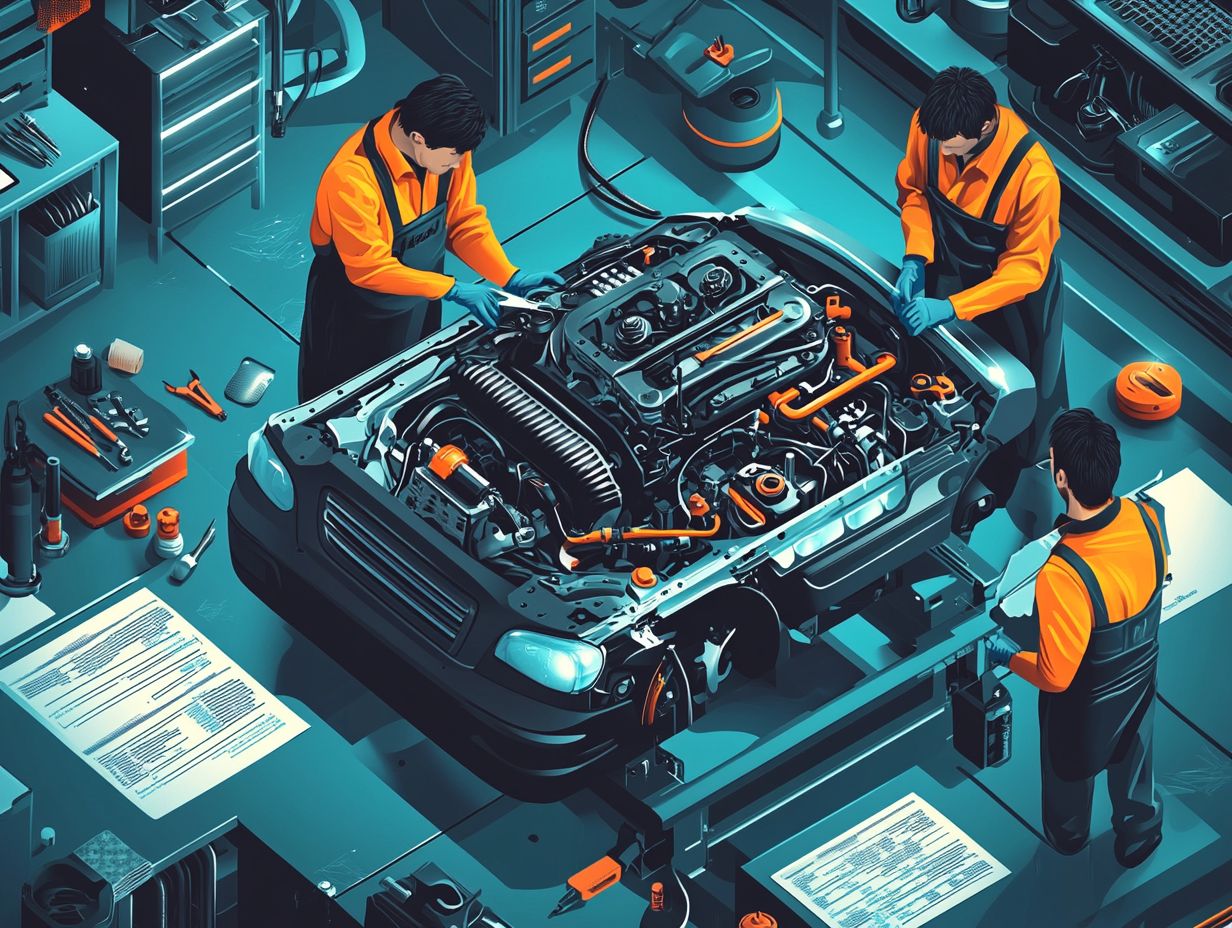
Preparing for an inspection? Start by gathering all your documents and ensuring your vehicle shines! This makes it easier for the inspection service to evaluate its status without any hitches.
Gathering Necessary Documents
Gathering the essential documents, such as the vehicle history report and warranty details, is crucial for ensuring a thorough vehicle inspection and understanding the car’s past. These documents illuminate the vehicle’s condition, previous ownership, and any potential issues lurking beneath the surface.
For example, the vehicle history report can unveil critical information, including accident history, service records, and title status. Each of these is essential for assessing the risk and reliability of the car.
Having warranty information readily available offers insights into any remaining coverage, enabling you to make informed decisions regarding potential repairs and the likelihood of future expenses.
Collecting and reviewing these documents helps you make informed choices. This can lead to safer and more satisfying purchases.
Ensuring the Vehicle is Ready for Inspection
Ensuring your vehicle is primed for inspection begins with a thorough visual check to identify any obvious issues that could impact the mechanical assessment later on.
Start by examining the exterior for any dents, scratches, or rust. These can be indicators of deeper problems lurking beneath the surface.
Next, turn your attention to the tires. Ensure they have adequate tread depth and are properly inflated. This enhances safety and boosts fuel efficiency.
Don t overlook the lights. Headlights, brake lights, and turn signals must all be in working order, as a burned-out bulb could lead to a failed inspection.
Moving to the interior, check that the seatbelts are operational and that there are no unusual odors that might raise eyebrows.
By presenting your vehicle in its finest condition, you instill confidence in potential buyers and make the entire selling process smoother and more advantageous for yourself.
Dealing with Inspection Results
To handle inspection results effectively, you must first understand the details of the inspection reports and determine the best course of action for any issues identified, especially when engaging with reputable sellers.
Understanding Inspection Reports
Understanding inspection reports is essential for you as a car buyer, as these documents lay out the findings from the inspection service. Knowing what to expect during a used car inspection can help identify common issues that may require your immediate attention.
These reports provide a comprehensive overview, highlighting crucial details such as the overall condition of the vehicle, any visible signs of wear and tear, and potential safety hazards.
For example, you might find a note indicating that the brake pads are nearing the end of their lifespan, signaling an urgent need for replacement. Additionally, issues like an oil leak or worn-out tires may be flagged, both of which could lead to costly repairs if not addressed promptly.
By carefully examining these sections, you enable yourself to make informed decisions and avoid unexpected expenses in the future.
Next Steps for Addressing Issues
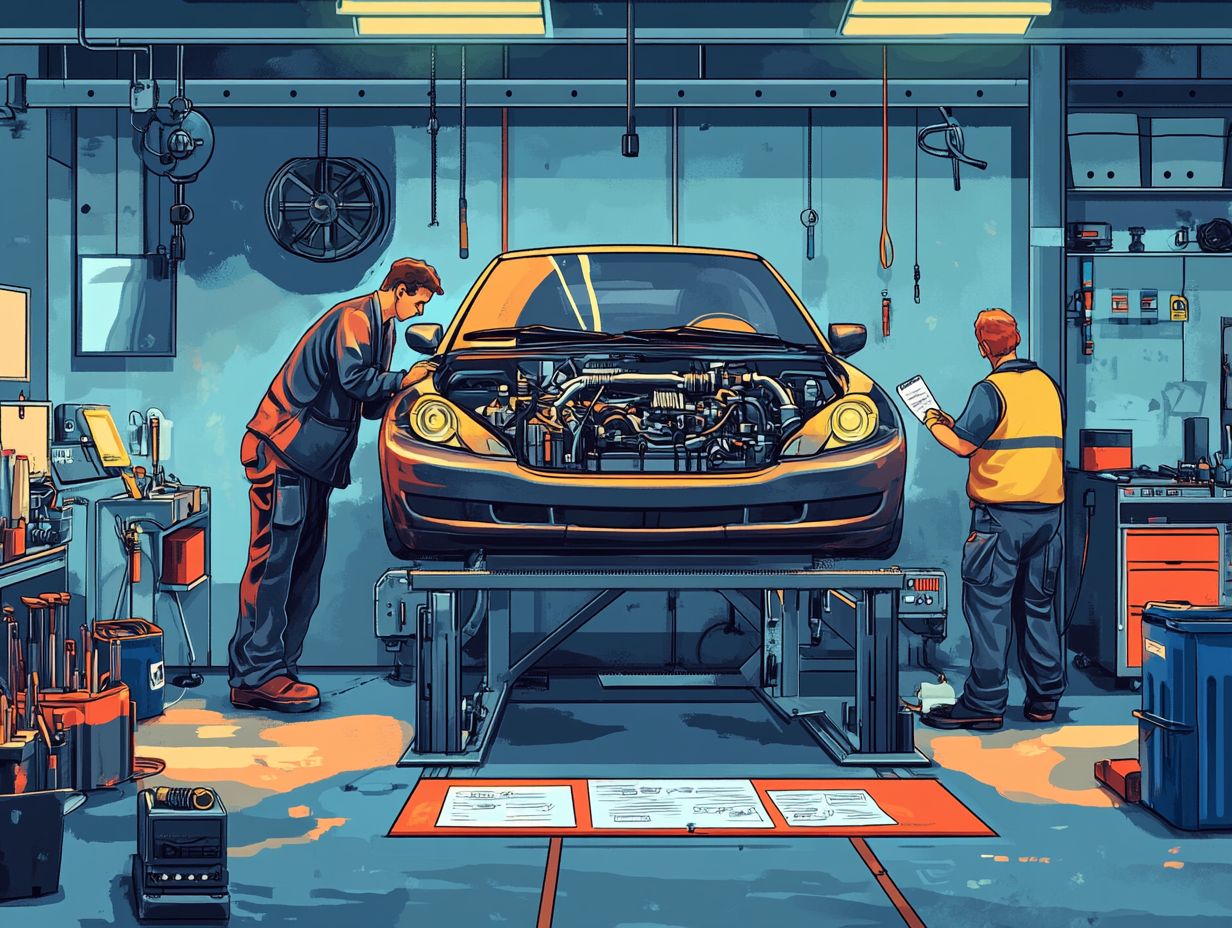
After you identify issues in an inspection report, the next steps involve addressing these concerns. It s often wise to consult with an independent mechanic who can help you prioritize the necessary maintenance for your vehicle.
Regular vehicle maintenance is crucial! It keeps you safe and extends your car’s lifespan. Start by scheduling a follow-up appointment with your trusted mechanic, who can provide a thorough assessment of the report s findings and recommend specific repairs or maintenance tasks tailored to your vehicle’s needs.
Open communication is key here; make sure you fully understand the urgency of each issue. Acting on these issues right away can save you from costly repairs later! By keeping a regular maintenance schedule, you can avoid future inspection failures, making the entire process smoother and significantly less stressful.
Frequently Asked Questions
What is a vehicle inspection and why is it important for car buyers?
A vehicle inspection is a thorough evaluation of a car’s condition and safety, typically performed by a mechanic or certified inspector. It is important for car buyers as it can reveal any hidden problems or safety concerns that may affect the car’s value and performance.
Have more questions? Don t hesitate to reach out for help!
Do all used cars require an inspection before purchase?
No, not all used cars need an inspection before purchase. However, getting a car inspected is a smart move to ensure you re buying a reliable and safe vehicle.
Who should perform the vehicle inspection?
A certified mechanic or inspector should conduct the vehicle inspection. They have the skills needed to evaluate the car and spot any potential problems.
What should be included in a vehicle inspection?
A vehicle inspection should cover a thorough check of the car’s exterior, interior, engine, and brakes. It may also include a test drive to assess overall performance.
How much does a vehicle inspection typically cost?
The cost of a vehicle inspection varies based on location and car type. On average, a basic inspection costs between $100 and $200, while a more detailed inspection can cost over $300.
Can a vehicle inspection be used for negotiating the price of a car?
A vehicle inspection report is a powerful tool in price negotiations. If the inspection uncovers issues, you can ask for a lower price or request repairs before finalizing the deal.



